The conference was attended by Defense Ministers and representatives from ASEAN countries, alongside eight partner countries, namely Australia, China, India, Japan, New Zealand, the Republic of Korea (RoK), Russia, and the U.S. Vietnamese Defense Minister General Phan Van Giang led a high-ranking delegation to the event.
   |
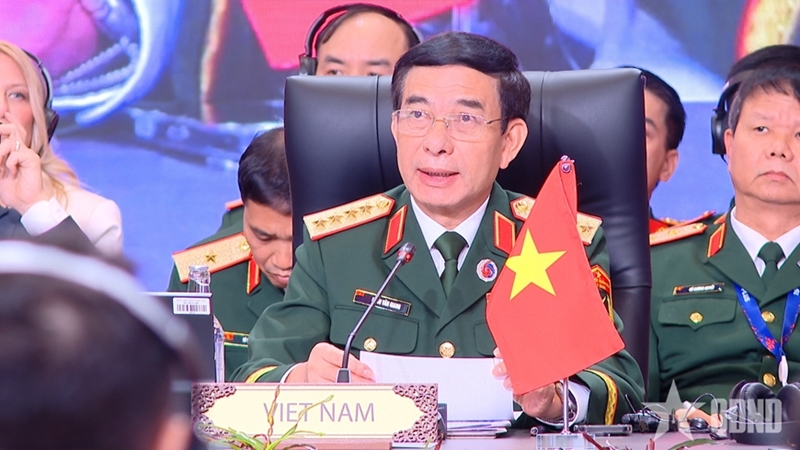 |
|
General Phan Van Giang speaks at the 12th ADMM+. |
In his opening remarks, Minister Dato' Seri Mohamed Khaled bin Nordin emphasized that 2025 marks 15 years of significant ASEAN-led ADMM+ cooperation. ADMM+ has proven its effectiveness as a ministerial-level mechanism for policy consultation and substantive defense and security cooperation. Over time, it has evolved to address practical needs and current realities, aiming to respond to emerging security challenges in the region.
Reflecting on past achievements, the Malaysian Defense Minister noted that defense cooperation between ASEAN and its partners has become increasingly substantive. He expressed hope that the 12th ADMM+ would continue to advance effective defense collaboration, contributing to peace, stability, security, and prosperity in the region and globally.
The meeting reviewed outcomes of the ASEAN Defense Senior Officials’ Meeting-Plus (ADSOM+), updated recent cooperation within ASEAN, exchanged views on regional and global security issues, and underscored the importance of dialogue, cooperation, peace, and stability.
In his speech titled “Looking back upon 15 years of ADMM+ and orienting future cooperation,” Vietnamese Defense Minister highlighted the special significance of the 12th ADMM+, marking a milestone in ADMM+’s 15-year development. The first ADMM+ was held in Hanoi in 2010, laying the foundation for an effective and substantive defense and security cooperation framework that has received strong support from all members.
    |
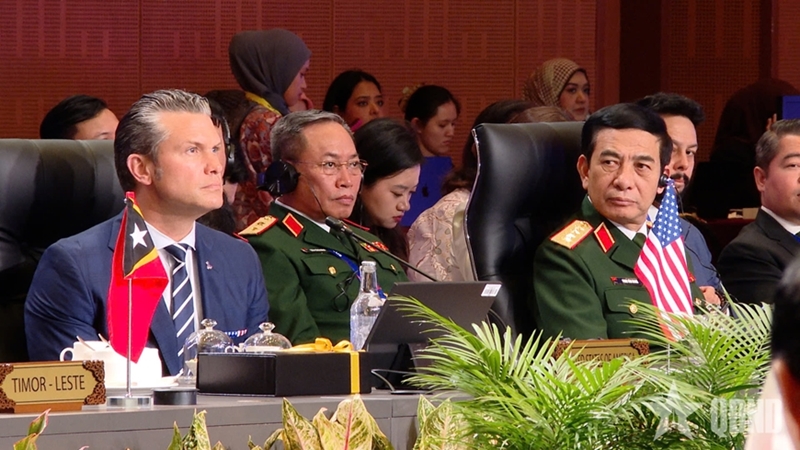 |
|
The Vietnamese Defense Minister and delegates at the event |
Over the past 15 years, ADMM+ has proven its value and role in regional security management, contributing significantly to peace and stability in Southeast Asia. It has become a cornerstone of defense and security cooperation in the regional security architecture. Expanding from the initial five areas of cooperation, the seven current ADMM+ Expert Working Groups not only see active participation from member states, but also attract attention from other countries and international organizations, reflecting a strong commitment to regional peace and stability.
General Giang noted that the world is undergoing transformative changes. Armed conflicts, tensions at hotspots, and non-traditional security challenges, including climate change, natural disasters, terrorism, trans-national crime, cyber-security risks, and potential misuse of artificial intelligence, are borderless threats directly affecting the lives of people. In this context, ADMM+ must strengthen cooperation to respond effectively to both existing issues and emerging challenges.
The head of the Vietnamese delegation suggested continuing to build strategic trust, the foundation for all cooperative efforts. Countries should promote open dialogue, respect international law, and uphold each other’s independence, sovereignty, and legitimate interests. Vietnam remains committed to resolving disputes peacefully, based on international law. Regarding the East Sea (aka South China Sea), Vietnam stresses the necessity of fully and effectively implementing the Declaration on the Conduct of Parties (DOC) in the East Sea to create favorable conditions for negotiating a substantive and effective Code of Conduct (COC) in the East Sea in line with international law, especially the United Nations Convention on the Law of the Sea (UNCLOS) 1982.
    |
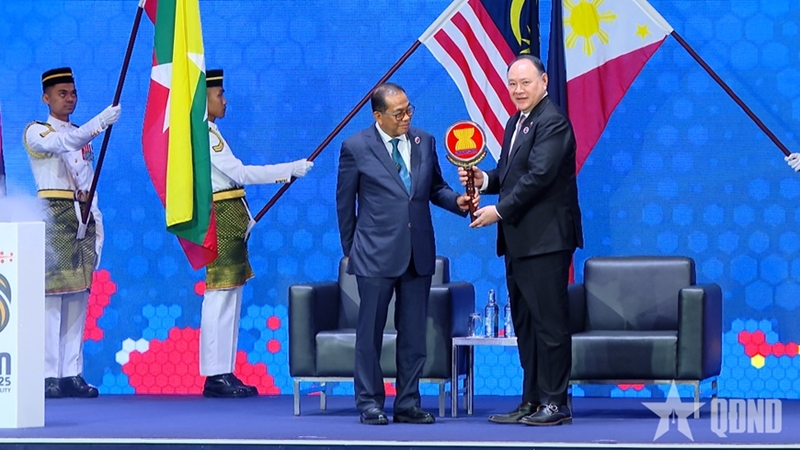 |
|
A view of the handover of ADMM and ADMM+ Chairmanship in 2026 |
Secondly, General Giang emphasized the need to strengthen unity among ASEAN members and between ASEAN and its partners while promoting ASEAN’s central role. A united, resilient, and pro-active ASEAN is essential for ADMM+’s success. He called on partner countries to further support ASEAN’s central role and work together to shape a common agenda that harmonizes interests and contributes to a secure regional environment.
Next, he suggested enhancement of substantive defense cooperation, focusing on priority areas and emerging challenges. Existing Expert Working Groups should be leveraged, while new areas such as cyber-security, digital transformation, and military governance of artificial intelligence should be explored, ensuring responsible use of these technologies.
    |
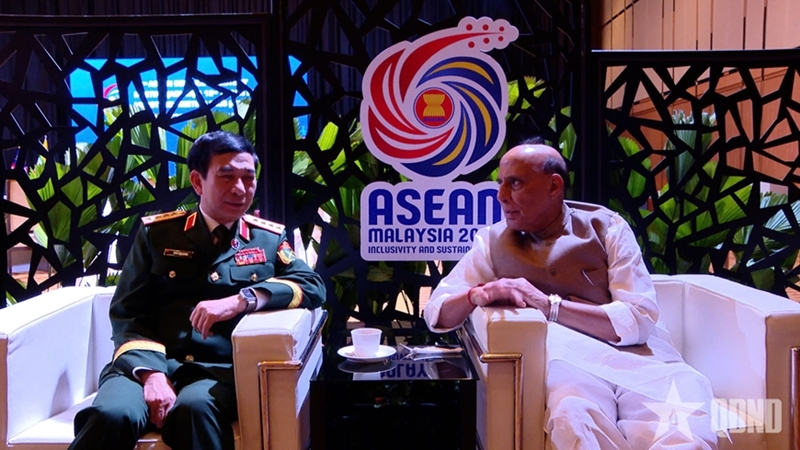 |
|
General Phan Van Giang has bilateral meetings with defense leaders from different countries. |
The fourth suggestion is linking capacity-building for common security challenge response with education, training, and development of high-quality human resources, which are key to sustaining self-reliance and resilient cooperation. General Giang encouraged partners to share expertise and support ASEAN in enhancing collective capabilities.
The last one is upholding collective responsibility for peace and shared prosperity. Security challenges are transnational, requiring joint efforts to share information, experience, and resources for effective responses.
The Vietnamese Defense Minister reaffirmed Vietnam’s commitment to being a pro-active and responsible member, working with ASEAN and its partners to contribute to a peaceful, stable, and developing region. He expressed confidence that with goodwill and joint effort, ADMM+ will continue to grow and serve as a successful cooperation model.
On the same day, a formal handover ceremony for the ADMM and ADMM+ Chairmanship took place in Kuala Lumpur, with the Philippine Department of National Defense assuming the Chairmanship for 2026.
    |
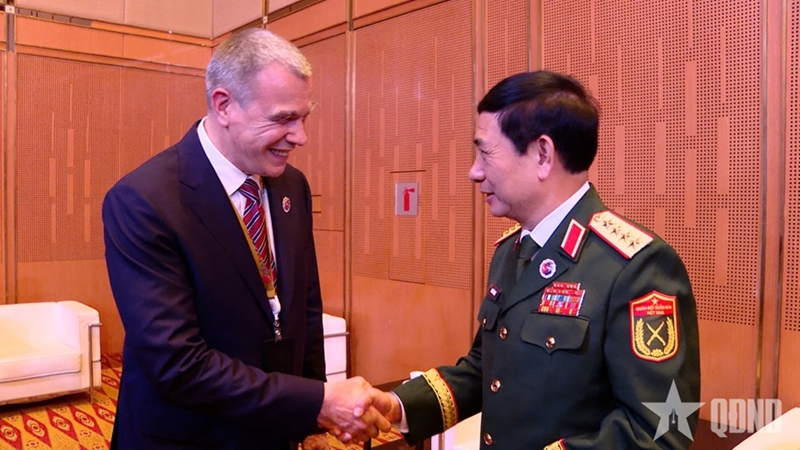 |
|
General Phan Van Giang has bilateral meetings with defense leaders from different countries. |
During the conference, General Phan Van Giang held bilateral sideline meetings with U.S. Secretary of War Pete Hegseth, Indian Defense Minister Shri Rajnath, Australian Deputy Prime Minister and Defense Minister Richard Marles, RoK Defense Minister Ahn Gyuback, Japanese Defense Minister Koizumi Shinjiro, and Russian Deputy Defense Minister Oleg Saveliev to discuss bilateral defense cooperation.
Translated by Tran Hoai